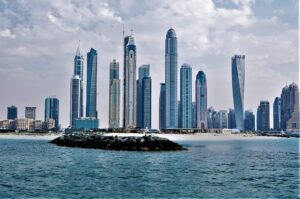Find out the right type of company in the UAE: Mainland or Freezone or Offshore

Dubai, the thriving business hub of the United Arab Emirates, offers entrepreneurs a plethora of opportunities. With the first half of 2022 witnessing a 25% increase in new businesses compared to the same period in 2021, it’s evident that Dubai lives up to its reputation as a dynamic economic center. However, before embarking on your company formation journey in the UAE, you must understand the different jurisdiction types and choose the one that aligns with your business activity, goals, and budget.
In this guide, we will walk you through the three main economic jurisdictions in Dubai: Mainland, Free Zone, and Offshore, helping you make an informed decision about where to register your business.
Mainland, Free Zone, and Offshore Companies: What You Need to Know
Mainland:
Mainland businesses are considered onshore companies, registered under the Department of Economic Development (DED).
They enjoy the flexibility of trading both within and outside the UAE with minimal restrictions. A mainland company is required to have a physical office rental contract, which must be provided to the Department of Economic Development (DED) as an essential document for acquiring the business license. If you don’t need one, contact your business consultant to offer you right solutions.
Under the most recent regulatory changes, the majority of business activities, with the exception of a select few strategic sectors, now allow for 100% foreign ownership, eliminating the requirement for a local sponsor.
Free Zone:
Dubai boasts numerous free zones designed to accelerate economic growth, each with its own regulations and governing bodies.
Businesses in free zones primarily operate within the zone and can benefit from 100% repatriation of profits and 0% customs duty.
The United Arab Emirates is home to a diverse array of over 40 free zones situated in various emirates, each with its distinct strategic goals and tailored solutions. These free zones can be categorized into two groups: designated and non-designated zones.
Under the most recent corporate tax regulations, designated free zone businesses engaged in the distribution of goods and meeting the specified criteria are entitled to a 0% corporate tax rate provide they fulfil all the criteria for qualifying freezone person and income. Furthermore, non-designated free zones can also qualify for a zero corporate tax rate if they engage in qualifying activities and meet all the necessary criteria as stipulated for free zone entities.
Offshore:
Offshore companies are established outside of the UAE, in international jurisdictions with different regulations.
Despite being located abroad, offshore companies must have a stake in a free zone or mainland business in Dubai.
Navigating Company Formation in UAE
- Registering your business in Dubai involves several steps, depending on your chosen jurisdiction. Here’s a general overview of the process:
- Determine Business Activity: Identify the activities you intend to pursue, as different jurisdictions may impose limitations on the number of business activities you can undertake.
- Choose a Company Structure and Name: Select an organizational structure (e.g., sole proprietorship, partnership, LLC) and ensure your chosen trading name complies with UAE regulations.
- Approvals and Permits: Obtain necessary approvals and permits, which vary based on your chosen jurisdiction. This involves liaising with government entities, free zone authorities, or local agents.
- Fee Payments and Office Setup: Finalize fee payments, complete all required processes, and set up your office space. Local agents or free zone authorities, like Virtue Corporate Services can simplify this process.
Mainland vs Free Zone vs Offshore: A Detailed Comparison
Consider the following factors when choosing your jurisdiction:
- Ownership: Mainland companies now allow non-Emiratis to own 100% of onshore companies for over 1,000 commercial and industrial activities. Free zone companies have full ownership, while offshore companies must be located outside Dubai.
- Business Activities: Mainland businesses can engage in trade locally and internationally, while offshore companies must operate outside the UAE.
- Visa Requirements: Visa allocation varies, depending on the jurisdiction and business size.
- Capital Requirements: Mainland and free zone companies have different capital requirements based on their legal structure, while offshore companies have no capital requirements.
- Legal Requirements: Mainland companies face a more rigorous legal process, while free zone companies benefit from simplified procedures. Virtue Corporate Services offers straightforward online business licensing.
- Costs: The costs associated with each jurisdiction differ, with mainland setups being costlier than free zones and offshore companies being the most economical.
Documentation Requirements
Ensure your documentation aligns with your chosen jurisdiction, considering legal structure and business nature. Legalization and translation may be required for documents from outside the UAE.
Mainland
- Owner/Manager/Director/s passport copies
- No Objection Certificate
- Passport size photo
- Copy of trade license
- Copy of Certificate of Incorporation
- Copy of Memorandum of Association
- Board Resolution
Freezone
- Owner/Manager/Director/s passport copies
- No Objection Certificate
- Passport size photo
- Copy of trade license
- Copy of Certificate of Incorporation
- Copy of Memorandum of Association
- Board Resolution
- Specimen signature of Manager/Director
- Share Capital Information
Offshore
- Owner/Manager/Director/s passport copies
- Owner’s details
- Passport size photo
- Bank Reference Letter
- Business Plan
- Copy of Memorandum of Association
- Board Resolution
- Certificate of Parent Company
- Corporate Structure Hierarchy
Which Jurisdiction Is Right for You?
All three jurisdictions offer unique advantages, making your choice dependent on your business's needs. Consider tax benefits, setup costs, asset protection, and the nature of your activities when deciding on company formation in Dubai UAE
FAQs:
1. What are the main differences between Freezone, Mainland, and Offshore companies in Dubai?
Answer: Each jurisdiction varies in terms of ownership rules, operational scope, visa regulations, and cost structures, catering to diverse business needs.
2. How does the business activity choice affect my company formation in Dubai UAE?
Answer: Depending on your chosen activity, different jurisdictions offer varying degrees of flexibility and restrictions that can impact your business operations.
3 .What are the ownership and control implications for each type of company setup?
Answer; Ownership rights differ across the three jurisdictions, with varying degrees of local and foreign control permitted.
4. What should I consider regarding visa requirements for each setup type?
Answer: Visa allocations vary based on the size of the enterprise and the jurisdiction, influencing the potential scale of your workforce.
5. How do the costs compare between setting up in Freezone, Mainland, or Offshore?
Answer: Each setup comes with different cost structures, including setup fees and ongoing operational costs, tailored to various business scales and objectives.



